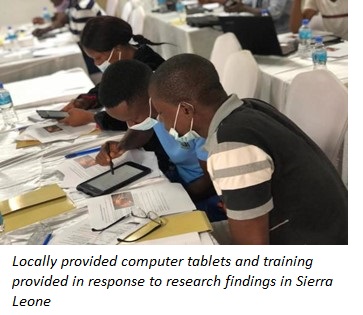TDR’s operational research training, which now includes strengthening research communication, is tackling antimicrobial resistance. Trainees from Ghana, Nepal and Sierra Leone provided a view into their studies and the impact from their tailored communications with key stakeholders.

From left: Robert Terry, TDR; Amara Leno, Sierra Leone; Lady Asantewah Boamah Adomako, Ghana; Jyoti Acharya, Nepal; Rony Zachariah, TDR
The Structured Operational Research and Training Initiative (SORT IT) has been working with seven countries since 2019 to increase capacity for operational research. The projects identify not only specific, local factors contributing to antimicrobial resistance, but also potential solutions to address this critical problem.
A key SORT IT module is on communications and advocacy, where participants learn how to structure a two-page, plain language handout on their findings with clear recommendations for how to address the issues. Two short PowerPoint presentations and a one-minute spontaneous pitch are developed from this. This training enabled these TDR researchers to present their work succinctly, with clear recommendations in under 10 minutes each, including Q&A.
Strengthening surveillance and monitoring in Sierra Leone and Nepal

Amara Leno reported his study on antimicrobial use in livestock in Sierra Leone, which documented incomplete reporting and insufficient human and material resources to collect surveillance data. After being presented with the findings produced through his SORT IT training, the Ministry of Livestock and the Food and Agriculture Organization mandated country-wide weekly reporting, conducted trainings on data collection and provided computer tablets and motorbikes to livestock officers.
A year later a second study assessed the impact of these actions and found the percentage of districts reporting data increased from 3% to 100%, and report completeness from 1% to 88%.
In 2019, Jyoti Acharya of the National Public Health Laboratory in Kathmandu, Nepal, assessed and compared the quality of reported data and barriers in nine district sites in her country against standards in the WHO Global AMR Use and Surveillance System.
Her findings led to updated standard operating procedures and protocols and improved infrastructure and data management training. “SORT IT helped me improve networking in One Health nationally and internationally,” Acharya said.

Communicating research findings in Nepal
One Health issues of agriculture and human health impact antimicrobial resistance
The safety of wastewater used for agriculture in Ghana was the subject of another SORT IT project, conducted by microbiologist Lady Asantewah Boamah Adomako of the CSIR-Water Research Institute in Ghana.
She found significantly high bacteria counts downstream of a treatment plant – which had been shown to be efficient at cleaning the effluent. This mean there was intense contamination from sources other than the treatment plant, and high resistance to critically important antibiotics in irrigation water. As a result, a research team is now piloting the use of biochar filters to reduce bacteria loads in stream water for irrigating vegetables.

Biofilters used to filter stream water for vegetable irrigation
SORT IT continues to provide support to AMR committees and governments. Martha Gyansa-Lutterodt, who led the Ghana AMR Committee during this research, says, “This is a good investment. This provides the evidence that can give us a new implementation process.”
For more information, contact Dr Rob Terry, TDR Manager, Research Policy
Through strong engagement with WHO offices, AMR committees and SORT IT partners, the programme has completed 74 projects, trained 225 people and published 62 articles in 10 journals.
The training also built long-term capacity. The majority of trainees went on to complete new studies, applying these skills to AMR and other topics. More than a third became mentors to future trainees.

